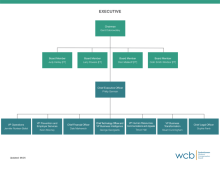The WCB is experiencing higher than normal call and email volumes. Thank you for your patience. For the quickest support, employers can:
Your Employer’s Payroll Statement (EPS) is due Feb. 28, 2026
How we are organized

The WCB has a five-person board consisting of a chair, two full-time board members and two part-time board members. Each is appointed by the provincial government. The board members are appointed after consulting with business and labour organizations. Two full-time board members are appointed to bring the viewpoint of employers to the board and two full-time board members are appointed to bring the viewpoint of workers.
The board believes that a strong governance framework is necessary to ensure that it fulfills its responsibilities to workers and employers in the most effective manner. As a result, the board is committed to ensuring that its governance structures and activities reflect sound governance principles.
The board decides the WCB’s broad strategic imperatives. It also makes certain that WCB operations and financial performance have the proper oversight. This requires board members to:
- Provide long-range objectives and policies.
- Recommend legislative change to the provincial government.
- Safeguard the WCB’s resources and assets.
- Monitor the WCB’s performance.
- Report to stakeholders.
- Hear and decide final appeals on employer classifications or worker compensation and benefit decisions.
The board’s primary responsibilities include overseeing financial and operational performance, reviewing and approving policies, and overseeing enterprise risk management.
Chair: Gord Dobrowolsky

The WCB’s chair, Gord Dobrowolsky, was appointed in 2013. From Prince Albert, Gord obtained his bachelor of education from the University of Saskatchewan and taught for five years before going into business. He operated Delta Management Ltd., a public relations and marketing company, for six years and spent 14 years in the cellphone industry, during which he earned SaskTel’s Top Dealer award nine times.
Gord has extensive board experience, having served as the vice-chair of the Saskatchewan Liquor and Gaming Licensing Commission, a member of the Saskatchewan Executive Council for six years and the chair of the Prince Albert Parkland Health Region for four years, beginning in 2009.
In addition to pursuing ongoing director and adjudication training, Gord has completed his certificate in adjudication for administrative agencies, boards and tribunals from the Osgoode Hall Law School of York University and has received his professional director designation from the Johnson Shoyama Graduate School of Public Policy.
Gord was a volunteer board member of the Victoria Hospital Foundation in Prince Albert for six years. He is currently a member of the Prince Albert and District Chamber of Commerce, the Prince Albert Elks Club and the Prince Albert and Saskatchewan Wildlife Federation, and is a supporter of Special Olympics and the Saskatoon Society for the Prevention of Cruelty to Animals (SPCA). In 2014, SaskBusiness named him one of Saskatchewan’s Men of Influence and in 2015 he was named to the Wall of Honour by the College of Education at the University of Saskatchewan. He was also a recipient of the Queen’s Platinum Jubilee Medal (QPJM) in 2022 and is actively involved with Ukrainian refugees in Prince Albert.
Worker representative: Judy Henley

Judy Henley is a member of CUPE Local 5430. Currently, she is the president of CUPE Saskatchewan, representing more than 30,000 members in the public sector. As a CUPE member, Judy has been active in the labour movement for more than 30 years, and has served and continues to serve in many leadership roles within CUPE at the local, provincial and national levels.
Driven by a passion for the rights of workers and her conviction that all workers should have access to good pension, benefits and injury compensation, Judy remains an active member representing CUPE on the 3sHealth benefits committees.
Employer representative: Larry Flowers

Larry Flowers, who is from Saskatoon, was appointed as the WCB employer representative in 2015. Larry brings strong and varied business experience to the board, which includes work in the agriculture, manufacturing, mining, finance and non-profit sectors. Since 1989, Larry has worked as an internal and external business strategist, implementing strategic human resources, training, safety and business solutions as owner and principal of Archer Strategy Enterprises.
Larry has a masters of adult education through St. Francis Xavier University, and a bachelor of education degree and a business administration certificate from the University of Saskatchewan. He holds a certificate in adjudication for administrative agencies, boards and tribunals from the Osgoode Hall Law School of York University, and also completed the ICD – Rotman Directors Education Program. He recently obtained his certificate in tribunal administrative justice from the Foundation of Administrative Justice (FOAJ).
Larry has a Chartered Professional in Human Resources (CPHR) designation and is a member of CPHR Saskatchewan, where he serves on the professional conduct committee. He serves as a volunteer board member of the FOAJ, cochairing the strategic planning committee. He has also served as a governance committee board member with the Saskatoon Industry-Education Council and has held a number of other volunteer board positions. Larry has chaired the Saskatchewan Mining Association’s human resources committee and was a member of the International Mining Innovation Institute’s Education and Training Panel, as well as the Saskatchewan Institute of Applied Sciences and Technology (SIAST) Mining Engineering Technologist Advisory Panel.
Part-time board member: Dion Malakoff

Dion Malakoff has extensive experience and was appointed as the executive director of the Saskatchewan Provincial Building and Constructions Trades Council in 2017. The Saskatchewan Building Trades is composed of affiliated unions representing organized construction workers in the province. Malakoff entered the Canadian Boilermaker apprenticeship program in 2000 and became a journeyman in 2003.
He has worked as a welder/fitter, foreman and general foreman prior to joining the staff at Boilermakers Local 555 where he was a business representative and then assistant business manager. During this time, he was involved with training and labour-management relations. Malakoff has recent WCB experience as a member of the 2022 Committee of Review.
Part-time board member: Colin Smith-Windsor

Colin Smith-Windsor is an engineer and a project management professional, with almost 20 years of experience in construction management. Since joining Graham Construction & Engineering in 2008, Colin has taken on several roles while delivering projects in the uranium, potash, oil and gas, and energy industries. Colin holds
a Bachelor of Science in mechanical engineering and is recognized for his exceptional management, leadership and interpersonal skills. In 2023, Colin was named as a recipient of the Top 40 Under 40 in Canadian Construction, recognizing his record of successful project execution. Colin has also been noted for promoting and achieving stronger partnerships with Indigenous communities, focusing on capacity development.
The WCB has a CEO and a six-person executive team. While the board sets the strategic direction for the WCB, it is the role of the executive and management to lead staff to deliver excellence in service and create meaningful value for WCB customers.
CEO: Phillip Germain

The WCB’s CEO, Phillip Germain, was appointed in 2019. He holds a bachelor of science degree from the University of Alberta and holds a professional designation from the Canadian Board of Registered Safety Professionals and Institute of Corporate Directors. After completing his degree, Phillip has had a long career as a health and safety professional, manager and executive, starting with the Alberta Construction Safety Association in 1991.
After moving to Saskatchewan in 1995 to work for the Saskatchewan Construction Safety Association, Phillip took on more progressive roles as the manager of the Agricultural Manufacturers of Canada Safety program in 1998, executive director of prevention at the Saskatchewan WCB in 2005 and vice-president of prevention, employer services and policy in 2012. In 2014, he was awarded Saskatchewan Safety Professional of the Year by the Saskatchewan Safety Council and received the International Collaboration Award by the International Association of Industrial Accident Boards and Commissions (IAIABC) in 2020. In 2022, he was awarded Queen Elizabeth’s Platinum Jubilee Medal.
Phillip’s rural roots have provided him with a strong sense of community and volunteerism. Phillip has volunteered for many community organizations, including the Ronald McDonald House 2012 Capital Campaign, Regina Minor Girls Softball Association, Regina Ringette Association, the Saskatchewan Institute of Applied Sciences and Technology (SIAST, now called Saskatchewan Polytechnic) and Saskatchewan Farm Safety Council. He has previously been a volunteer board member on the Canadian Centre for Occupational Health and Safety (CCOHS), Saskatchewan Safety Council and the Saskatchewan Brain Injury Association.
Phillip is currently a vice-chair of the International Social Security Association’s technical commission on insurance against employment accidents and occupational diseases. He is currently on the board of directors of the IAIABC and the Association of Workers’ Compensation Boards of Canada (AWCBC).
Vice-President, Business Transformation Program: Stuart Cunningham

Stuart Cunningham has been with the WCB since February 2017 and currently serves as the vice-president, Business Transformation Program. He sponsors the WCB’s multi-year initiative that will see a radical transformation of services, process and technology to better meet the service expectations of the WCB’s customers. In this role since May 2021, Stuart has overseen the maturity of key competencies that will enable successful transformation, including program management, project delivery, organizational change management and process improvement.
Prior to that, Stuart was the vice-president, human resources, communications, continuous improvement and appeals at the WCB. During that time, he oversaw an organization-wide improvement effort that resulted in the deployment and successful adoption of a daily management system, and the initiation of a corporate-wide culture of continuous improvement. Stuart also invested in the long-term health of the organization through establishing organizational development and staff safety programs.
From 2011 to 2017, Stuart served as the vice-president, human resources at the former Five Hills Health Region (now Saskatchewan Health Authority). During this time, Stuart led the people, process and staff safety components of the region’s new hospital project. It was a multi-year endeavour that involved the move from the old Moose Jaw Union Hospital to a new modern hospital just off the Trans-Canada Highway. In addition to leading design and process improvement workshops, Stuart enabled the successful completion of the project through developing strategies and plans for change management, communications, labour relations, organizational development and staff safety.
From 2008 to 2011, Stuart had served the Five Hills Health Region as a senior labour relations consultant with the Saskatchewan Association of Health Organizations (SAHO), where he also led the negotiation of a number of health-care collective bargaining agreements and participated in the negotiation of essential services agreements.
Stuart’s education includes a bachelor of law degree graduating with honours from the National University of Galway in Ireland. Stuart is also a certified lean leader, graduating from the John Black and Associates (JBA) program in June 2014.
Born and raised in Dublin, Stuart moved to Regina, Sask. in 2006. He is passionate about soccer and loves to travel.
Chief Technology Officer and Vice-President, Business Intelligence: George Georgiadis

George Georgiadis is an accomplished professional with more than 25 years of experience in senior IT positions in Saskatchewan, Alberta, Ontario and New York that display continuous advancement and recognition of achievement. George moved from Athens, Greece to Saskatoon Sask. to pursue his post-secondary studies. He holds a bachelor of science degree in computational science and a masters of business administration from the University of Saskatchewan.
George’s strengths include leading an organization through the creation of multi-year information management/information technology (IM/IT) strategic plans aimed to meet organizational strategic goals and objectives. During his tenure, George has successfully completed numerous initiatives that moved organizations forward in digitization, automation and paperless strategies.
Incorporating emerging industry analytic trends and the use of intelligent automation were critical success elements in such strategic initiatives.
In April 2020, George was appointed as chief technology officer and vice-president, business intelligence of the Saskatchewan Workers’ Compensation Board. His previous roles included chief technology officer and senior operating officer for Capital Health (health authority now part of Alberta Health Services), as well as vice-president, application management and support service for eHealth Ontario.
Vice-President, Human Resources, Communications, and Appeals: Trevor Hall

Trevor Hall holds a bachelor of commerce degree from the University of Saskatchewan. Since completing his degree, he has acquired more than 20 years of experience leading functions and teams of various disciplines. Throughout his career, he has demonstrated a passion for roles and working for organizations that are focused on supporting and enabling people in some way.
Trevor began his professional career working as the manager of human resources and communications for WPD and Rosthern and District Ambulance. Over the years that followed, he progressively developed his expertise through roles as a human resources consultant for the Battlefords Health District, the director of human resources, finance and supportive services for South Country District Health, and the manager of employment services for the Regina Qu’Appelle Health Region. He also worked for Canadian Blood Services for four years, first as a manager of human resources and then as a senior employee relations consultant for Western Canada.
Trevor joined the Saskatchewan WCB in 2012 as the director of human resources. In May 2021, Trevor was appointed the vice-president of human resources, communications and appeals. Trevor also currently serves as a member of the human resources committee for the American Association of State Compensation Insurance Funds (AASCIF).
Vice-President, Prevention and Employer Services: Kevin Mooney

Kevin Mooney holds a masters of business administration from the University of Fredericton and a bachelor of human justice degree from the University of Regina, and is a Canadian Registered Safety Professional.
Early in his career, Kevin worked in law enforcement, including an appointment as a peace officer promoting commercial traffic safety on Alberta’s highways. After moving back to Saskatchewan in 2003, Kevin’s career transitioned into the field of health and safety where he gained progressive experience in the transportation, agriculture, commodity and wholesale/retail sectors.
Kevin joined the Saskatchewan Workers’ Compensation Board in December 2017 as director of prevention and was promoted to vice- president, prevention and employer services in 2019. In his current role, Kevin provides leadership and strategic direction to injury prevention initiatives in the province, including WorkSafe Saskatchewan, and assumes responsibility for the WCB’s employer services programs.
Kevin brings with him more than 20 years of experience in delivering health and safety solutions to the workplace, was recognized as the Saskatchewan Safety Professional of the Year in 2011 and received the Premier’s Award for Excellence in the Public Service in 2015 and 2018.
Kevin also serves as the president of the Saskatchewan Safety Council and previously served as chair of the South Saskatchewan Chapter of the Canadian Society of Safety Engineering.
Vice-President, Operations: Jennifer Norleen-Beitel

Jennifer Norleen-Beitel is currently the vice-president of operations with the Saskatchewan Workers’ Compensation Board (WCB). With more than 15 years of experience with the WCB, Jennifer has held a number of leadership roles, and played an integral role in improving the communication of premium rates and the WCB’s rate model enhancements. In her current role, Jennifer is responsible for advancing a claims transformation, which includes shifting the WCB’s service delivery model to incorporate work disability prevention and mitigation practices to enhance outcomes for workers and employers. Jennifer is passionate about reducing the human, social and financial impact that injuries have on workers, employers and the community overall.
Jennifer received the International Association of Industrial Accident Boards and Commission (IAIABC)’s NextGen Award in 2018. She currently serves as vice-chair of the IAIABC work disability prevention and return to work committee, and is also a member of the International Social Security Association’s Special Working Group on Rehabilitation.
Chief Financial Officer: Dale Markewich

Dale Markewich brings a wealth of experience to the WCB. Prior to joining the WCB, Dale served as chief financial officer for the Saskatchewan Healthcare Employees' Pension Plan where he oversaw financial strategies, actuary and investments.
His extensive background also includes his tenure as director of special projects and research where he led key initiatives and analyses to drive organizational improvements. Additionally, as vice-president of corporate services at the Saskatchewan Association of Health Organizations, Dale demonstrated exceptional leadership, managing corporate services and advancing organizational goals.
Chief Legal Officer: Sophie Ferré

Sophie Ferré, J.D. is the executive leader for the WCB’s legal, policy and corporate services functions. She has a bachelor of social science degree (University of Ottawa) and a Juris Doctor degree (University of Saskatchewan). Sophie was called to the Saskatchewan Bar in 2014 and spent 3 years in private practice before accepting the position of Chief of Staff to the Minister of Justice and Attorney General of Saskatchewan. In 2017, Sophie became in-house counsel with SaskPower and practiced in the areas of Construction Law, Technology and Security Law, Procurement Law and Corporate Governance. Sophie started working for the Saskatchewan Workers’ Compensation Board in April of 2023 as General Counsel and in June of 2025, Sophie’s role transitioned to the Executive and she now occupies the position of Chief Legal Officer.
The six-member executive team, led by the CEO, ensures the effective and efficient functioning of the WCB by managing its day-to-day work in the following key areas: operations, prevention, employer services, strategic finance and corporate services, information technology services, business intelligence, human resources, communications, appeals, continuous process improvement and business transformation.
- Operations
- Operations administers injury claims and benefit payments. Operations provides workers with vocational services, health-care and medical support. Staff in operations work collaboratively with workers, employers and health-care providers to facilitate the development of recovery and return-to-work plans. Staff members have a high level of expertise. They are committed to guiding teams toward optimal outcomes tailored to meet individual needs.
- Case management units are responsible for providing assistance and services to our customers who require additional support to recover from their injuries and return to work. The case management teams consist of six regional teams, the psychological injuries unit and an extended services unit.
- Regional teams: The regional team units consist of six case management teams. Each team serves a distinct region within Saskatchewan and includes customer care facilitators, vocational rehabilitation specialists and case management support.
- Psychological injuries: The psychological injuries unit supports customers who have experienced a psychological workplace injury. This unit comprises customer care facilitators who have received specialized training in the field of psychological injury. They provide personalized recovery support and return to work services tailored to each individual’s needs.
- Extended services: The extended services unit supports customers who have experienced a catastrophic workplace injury. This unit comprises customer care facilitators who have received specialized training in the field of catastrophic injuries and fatalities. They provide personalized and individualized care to impacted individuals and their families. Additionally, this unit extends compassionate support and care to the families of those who have been fatally injured due to a work-related incident.
- Claims support and adjudication
- Claims entitlement: A claims intake representative gathers the information needed to make a decision on a claim. The adjudication by decision model or an adjudicator in the claims entitlement unit will make the decision. Early recovery and return-to-work support is a priority at the WCB, even sometimes while waiting for a decision to be made on the claim. For instance, psychological injuries will receive a certain limited number of counselling sessions while a claim is being adjudicated. Customer care facilitators adjudicate claims that may be more complex to assess for acceptability. They contribute to developing a positive and collaborative relationship with our customers that fosters early communication.
- Administrative support: Administrative support ensures timely and clear correspondence with WCB’s customers through various mediums. They process communications in accordance with applicable policies and procedures and collaborate with internal departments and external stakeholders to improve communication.
- Claims payments: Payment specialists within the claims payments team are responsible for calculating earnings loss (also known as wage-loss) payments for workers, employers and dependants. Where applicable, this department reimburses out-of-pocket medical and travel expenses and issues various allowances to customers and third parties for the life of the claim.
- Claims inquiry line: The claims inquiry line operators assist customers by providing straightforward information in response to general claim inquiries and documenting the conversations in the claim file. This team also routes non-claims related or more complex inquiries to the correct department or individual.
- Registry: The registry team is responsible for setting up and processing new claims. This includes obtaining and maintaining customer information within the WCB system and providing customers with information on WCB claims process and expectations. The registry team assigns employer coverage, classifies each claim and applies appropriate document codes to match to each claim file.
- Interjurisdiction and federal unit: The interjurisdiction and federal unit assesses claims that may fall under the interjurisdictional agreement. This agreement outlines the procedure for worker claims that may be eligible for benefits in multiple provinces. For straightforward federal government claims, they will assess claim acceptability and entitlement for benefits under The Workers’ Compensation Act, 2013.
- Service excellence: Considered experts in adjudication, claims management and vocational rehabilitation, this team provides training and support to all operations staff. This support includes orienting and providing staff with an in-depth understanding of the WCB’s policies and procedures. Service excellence also reviews claim files and provides coaching to ensure quality outcomes.
- Health-care services
- Health-care services: Health-care services assists care providers and workers by facilitating access to medical assessments, treatments, diagnostic tests and specialist appointments. Health-care services also provides support for care providers and WCB staff to resolve concerns that develop during treatment and return-to-work programs.
- Medical accounts: Medical account services provide medical information, evaluation and support services to the WCB’s operations and appeals departments.
- Case management units are responsible for providing assistance and services to our customers who require additional support to recover from their injuries and return to work. The case management teams consist of six regional teams, the psychological injuries unit and an extended services unit.
- Prevention and employer services
- Prevention promotes injury prevention and safety education. This department collaborates with employers, workers, labour unions and other stakeholders to develop health and safety management systems, conduct serious injury investigations and hazard assessments, and provide claims and return-to-work consulting. In addition to delivering legislative training, prevention staff engage with stakeholders through events, presentations and tradeshows, promoting workplace safety and supporting the implementation of employer safety and health programs. Prevention department staff are members of WorkSafe Saskatchewan, the partnership between the Saskatchewan Workers’ Compensation Board and the Ministry of Labour Relations and Workplace Safety.
- Employer services registers employers by industry, completes payroll assessments, collects premiums, handles employer account inquiries, assigns employer claim coverage and audits employer records to ensure payroll is reported correctly. Employer services provides management of employer classification, experience rating and rate setting.
- Employer premiums: The employer premiums team is responsible for customer service and communications surrounding the rate setting process, experience rating program, industry classification structure, payroll audit and collection activities.
- Employer services: The employer services team registers employers by industry, completes payroll assessments to determine annual premiums owed to the WCB, handles business closures, sales and amalgamations, issues letters of good standing and clearance certificates, assigns employer coverage to complex claims and responds to employer account inquiries.
- Strategic finance and corporate services
- Finance and corporate services oversees several key functions that enable the WCB to meet its strategic objectives and business obligations, including strategic finance, corporate, actuarial, audit and legal services, and facilities and emergency planning.
- Actuarial services extracts data, analyzes it to identify trends and patterns, and uses it to create financial models and forecasts. These models are used to determine the premium rates employers pay and to evaluate the past and potential future financial impact of events and business decisions.
- Corporate services provides payments to health-care providers, procures goods and services, and processes incoming information. The vice-president of corporate services is also responsible for managing the WCB facilities in Regina and Saskatoon.
- Financial services provides stewardship of the WCB’s financial resources, including its investments, to ensure the organization has adequate funds to meet its obligations and strategic objectives.
- Internal audit provides independent, objective assurance and consulting activities designed to add value and improve the WCB’s operations. The unit helps the WCB accomplish its objectives by bringing a systematic, disciplined approach to evaluate and improve the effectiveness of risk management, control and governance processes. Internal audit also conducts investigations into any allegations of fraud.
- Legal and policy provides legal, legislative and policy advice and counsel to the WCB. These responsibilities include providing legal advice to WCB staff, developing policy directives that govern WCB staff and overseeing privacy and other legislative considerations.
- Facilities and emergency planning is responsible for maintaining and co-ordinating new construction projects for the WCB’s offices, meeting rooms and workstations in Regina and Saskatoon. They respond to facility requests in the workspace environment relating to security, building, electrical, office spaces, furniture, temperature, kitchen/copier room and telephones.
- Information technology services and business intelligence
- Information technology provides business-focused IT services and support that address current and upcoming opportunities and risks through reliable and suitable technology solutions.
- Application services: Application services provides strategic technology consultancy, recommendations and implementation services to WCB units, including software application implementation service and support. These services include financials, human capital management, worker claims and employer accounts management systems, customer portals and Microsoft SharePoint and Power Platform.
- Business analysis and quality assurance testing assists the WCB in maturing and improving WCB’s business analysis and testing operations and practices. This plays a central role between business teams and IT teams to ensure alignment of capabilities delivered by the information technology team to the needs of the business. Quality assurance testing includes application testing, defect reporting and application production support.
- Application services: Application services provides strategic technology consultancy, recommendations and implementation services to WCB units, including software application implementation service and support. These services include financials, human capital management, worker claims and employer accounts management systems, customer portals and Microsoft SharePoint and Power Platform.
- Business intelligence supports the WCB and our partners in leveraging data assets to make data-driven decisions in service of our customers. BI supports the strategies and technologies for managing business information and data analytics. This support includes data abstraction and provisioning (acquisition, integration and transformation, storage), data governance, reporting, dashboards, data processing, data mining, machine learning and artificial intelligence. BI works directly with business units and leaders across the organization to understand their processes and needs and provide support.
- Infrastructure and operation services
- IT technical services: The IT technical services department is responsible for managing the IT and business intelligence infrastructure to meet the strategic, tactical and operational needs of the WCB and its customers. Technical services is responsible for implementing, improving, managing and monitoring the WCB’s network (voice and data), database systems, servers, storage and data centres.
- IT information security: The IT and business intelligence security team protect the WCB against internal or external security attacks that disrupt its business operations. The team members continuously improve the WCB’s security controls and procedures and ensure that all WCB employees know their role in protecting WCB systems and the privacy of our customers and employees.
- IT support services: IT and business intelligence support services provide the first point of contact for support to all WCB clients (internal and external). This department analyzes, troubleshoots, installs, performs deskside or remote support, and provides resolutions to issues related to personal computers, hardware, peripherals, printers, multi-function devices, custom and packaged software, and network connectivity for internal and external users.
- Enterprise project management office
The enterprise project management team provides project management practices, methodologies and training on project standards across all WCB units. Its functions include intake management, prioritization and delivery of projects that support the strategic, tactical and operational needs of the WCB. Partnering with senior leaders across all business units, the team supports business planning and execution. The office promotes and facilitates a strong governance and decision-making methodology with a transparent approach to risk and issue management, change control, escalations and reporting.
- Infrastructure and operation services
- Human resources, communications and appeals
- Human resources provides the systems and resources to guide the people side of our business. HR manages recruitment, development, employee relations, employee compensation and benefits, organizational effectiveness and employee health and safety functions.
- Organizational development: Organizational development supports the WCB in delivering the best results for its customers by identifying, designing and installing people development tools and systems. This support includes the WCB’s daily management system, leadership development and coaching, which are aligned with our foundational principles of excellence and help to reinforce our desired culture.
- Human resource services: Human resource services includes human resource business partners and staffing and diversity functions. These partners are the primary contact for leadership in navigating the services offered by human resources and support leaders in addressing people-related issues. The staffing and diversity team is the first introduction to the organization for new and future employees, providing recruitment and orientation while promoting a culture of diversity and inclusion.
- Compensation and benefits: Compensation and benefits is accountable for the research, development, implementation and administration of compensation, benefits, wellness and payroll processes and programs that support the WCB’s ability to attract and retain long-term employees.
- Safety: Safety provides and enhances the systems, tools and resources to allow leaders to manage the safety of their staff effectively. Safety provides leadership, expertise, consultation and hands-on safety assistance to all organization members.
- Learning and development: The WCB’s learning and development team leads the development, implementation and sustainment of an enterprise-wide talent development strategy. This strategy works to enable an agile, high-performing and engaged workforce. Learning and development works in close collaboration with business-area trainers, WCB leadership and other areas of human resources. They advance the organization through adaption and deploying leadership and staff development programs, resources, and tools designed to build future-ready talent across the organization.
- Communications provides marketing, internal and external corporate communications support to leadership, staff and stakeholders of the WCB. This department is also responsible for media relations and event management.
- Appeals provides the first level of appeal for decisions on claims. Workers and employers who disagree with a decision made by the WCB’s operations department in a work-related injury claim can submit an appeal to the WCB’s appeals department. The appeals department is independent of the operations department. It conducts an independent review that analyses key facts and evidence on the appeal issue. This review can involve requesting additional information and opinions to inform the decision. A decision will be rendered using the principles of natural justice and will be fair, reasonable and based on the merits of each individual claim.
6. Business Transformation Program
- The WCB's Business Transformation Program is a multi-year journey of people, process and technology changes focused on meeting our customers’ needs. The program will support and involve the WCB’s staff as they collaborate with customers and partners to transform how they deliver products and services across all business areas. Through this collaborative effort, the WCB will make the changes needed to support workers and employers, reduce claim costs and lost work time and prevent disabilities.
- Strategic improvement: Strategic improvement supports process improvement initiatives across the WCB. Working closely with division leaders, this department organizes events, projects, workshops and training. They support staff in enhancing their unit’s operations and collaborate on improvement initiatives with other WCB teams, stakeholders and customers. This department is also a resource to WCB staff for improvement methodologies, tools and templates.
- Change management office: The change management office helps to ensure that people-related changes are effectively managed, communicated and embedded within the WCB to achieve the desired outcomes. The office consists of a director, change managers and a dedicated communications manager. The team assesses change readiness and supports leaders to lead their teams through change. The office manages the WCB’s change network, which is a collective of staff representatives from every business unit. The change network connects with peers and project teams to share information and collect feedback about the business transformation and other change projects.
- Program delivery services: The program delivery services team oversees the quality and timely delivery of the program’s components through a focus on governance support, integrated planning and resource management, benefits realization management, financial and budget management, vendor performance management, information and knowledge management, quality assurance, risks and issues management, and human resources support. These areas of focus are specific to the Business Transformation Program project, not enterprise-wide activities.
Other WCB departments
- Board: The board decides the WCB’s broad strategic direction and governance. It ensures that the WCB’s operations and financial performance have the proper oversight. The board’s primary responsibilities include overseeing financial and operational performance, reviewing and approving policies and overseeing enterprise risk management. The two full-time board members also serve on the audit committee.
- Board Appeal Tribunal: The chair and two full-time board members form the Board Appeal Tribunal. Saskatchewan is unique among Canadian jurisdictions. It is the only province with a full-time board that divides its duties between the governance and final appeal functions. In its role as the tribunal, the board is the highest level of appeal at the WCB. The board also has exclusive jurisdiction to determine several types of applications under the Act. Applications include Section 169 requests and Medical Review Panels. The tribunal hears appeals from workers and employers when they disagree with a decision made by the WCB’s appeal department.
- Board services: Board services consists of eight assistants to the board and three administrative supports. Board services provides administrative support to the Board Appeal Tribunal in managing final-level appeals and applications, including determining whether the appeal or application can be registered. The assistants to the board will summarize appeals and applications and arrange and attend in-person or virtual meetings between the Board Appeal Tribunal and the customer.
- The Fair Practices Office (FPO) is an independent office within the WCB that contributes to fairness in WCB practices and procedures by receiving and investigating inquiries from workers and employers. The FPO is a resource for workers, employers, authorized representatives, external service providers, the general public and the WCB. As an office that is impartial and confidential, the FPO listens to customers’ concerns, provides information on how the WCB system operates and works to resolve problems. The FPO reports directly to the WCB board of directors through its chair.
